THE AR T OF P E RSUASION
Speaking in public is becoming more essential than ever.
FIRS T DAYS OF SC H OOL
The American International School of Zurich opened its doors in 1963. This is the story of those first days.

A L IF E UNPAC KE D
Everyone remembers their first week in Switzerland. You share your stories.

voices The magazine of the ZIS Community Winter issue 2016/17

































































































































































GENÈVE RUE DU RHÔNE 62 +41 22 318 62 22 LUGANO VIA NASSA 5 +41 91 923 51 56 ST. MORITZ PALACE GALERIE +41 81 833 51 77 ZÜRICH BAHNHOFSTRASSE 64 +41 44 227 17 17 LUZERN KAPELLPLATZ 5 +41 41 227 10 50 WWW.LESAMBASSADEURS.CH
Director of Community Relations: Michaela Seeger (mseeger@zis.ch)

Editor: Rachel Ditchfield (rditchfield@zis.ch)
We'd love to hear from you, so please contact: voices@zis.ch, Zurich International School, ZIS Community Relations, Steinacherstrasse 140, 8820 Wädenswil, Switzerland
To advertise in the magazine please contact: voices@zis.ch
Copyright © 2016:


Zurich International School. The opinions expressed in Voices are those of the contributors and not necessarily those of Zurich International School or YBM Ltd.



ZIS Voices is produced on behalf of ZIS by YBM Ltd info@ybm.co.uk / www.ybm.co.uk
Cover photography: Staircase at Spinnergut Villa, by Nato Welton

ZIS VOICES WINTER 2016/17 | 1
CONTENTS Winter 2016/17
faces 02 Welcome 03 News 05 Jeff Paulson 06 After school 09 Small world 10 Globetrotter 12 On the lake features 14 The art of persuasion 22 Perspectives 24 Grand designs 28 The new internationalists 34 A life unpacked network 41 In the classroom 43 Community support 45 Life hack 46 ATAC 48 Classnotes 46
music: vibrant and inspirational
ATAC
voices
W E LCO M E to the winter issue of Voices magazine
Michaela Seeger Director of Community Relations.
Welcome to the winter issue of Voices magazine. What do you – our alumni, parents, students, faculty and staff – say about ZIS? You describe us as a close-knit family. You talk about our community. And I am delighted to say that the introduction of ZISMeets has given that community another opportunity to come together. This year, ZIS friends have convened for a walking tour in Chicago, a discussion of design and graphic art in Boston and an evening with past parent and principal conductor of the MET, Fabio Luisi, in New York. At the heart of ZISMeets is the chance to connect, learn and grow together. We hope to see you there – to renew bonds of friendship and forge new ones.
In this issue, we examine the many ways in which the ZIS community is built on friendship, from our earliest days to the present. In 1963, parents, faculty, staff and students came together to paint and assemble a new school that would become AISZ. It was an amazing expression of friendship –we tell their story on page 24.
Everyone remembers their first week in Switzerland – the half-unpacked boxes, the new language and a new school system to navigate. On page 34, parents recall their first days – and the friends who helped them get through those first months by becoming their ‘Swiss family’. On page 14 we examine why public speaking has become an essential twenty-first century skill, and on page 28 we discuss why international teachers are often a breed apart.
Your thoughts and memories prompted by the last issue of Voices have been enjoyed online by our community around the world and we hope you will be inspired to connect and share again. So please do write, email, call and meet us. We are here to help you get in touch with each other and your school – and we look forward to hearing from you.
L
ETTE R S Get in touch
We are always delighted to hear from you. Please email us at voices@zis.ch
OUTDOOR P URSUITS
The article on Kindergarten explorations of the forest that surrounds part of our Lower School (Voices, spring 2016) put an important highlight on ways teachers regularly integrate the natural environment into learning by encouraging exploration. Learning outdoors is authentic learning and, as the article points out, learning that can unite the traditionally separated disciplines, such as art and science. The ZIS experience is so much richer for the classes, clubs and trips that delve into Switzerland’s diverse landscape and the world beyond, as well.
Ian Hoke, Upper School English teacher, Global Citizen Diploma coordinator, Whitewater Kayak
Club instructor and parent
H A PPY MEMORIES
I just wanted to congratulate you on the impressive edition of Voices which arrived in the west of England, bringing with it memories of our 10 happy years in Switzerland. Our family now has an enduring reason to remember our connection with AISZ/ZIS, as in May our daughter Claire, Class of 2004 (1999-2004), married Stuart Roscoe, Class of 2004 (2002-04), with a number of their school friends in attendance (see Classnotes on page 48).
Sue Poolman, alumni
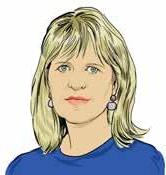
INS P IRED TO ACT
parent
I really enjoyed reading Voices magazine and hearing all about what was going on around the school. It was also nice to read about the students who have been to ZIS and it made me feel very connected to my school. After reading the magazine I thought it would be a really good idea to start a student magazine for the Lower School. I hope to continue working on this idea with my friends and staff this year.
William Picton, Grade 5
2 | ZIS VOICES WINTER 2016/17
ZIS Partners
A new initiative has been launched to strengthen a key part of the successful ZIS Experience, the school’s partnership with its stakeholders.
ZIS Partners will collaborate with stakeholders and focus on issues that are relevant to the present and the future.
The initiative started with an audit –called Parental Perspectives – when three consultants met with almost 300 parents in order to better understand the ZIS Experience from their point of view.
Events such as roundtable discussions around specific topics involving alumni and corporate partners are planned throughout the year.
Visit www.zis.ch/zispartners to find out more about the initiative.
LinkedIn
Professional networking among the school community has become even easier, now that ZIS alumni can choose Zurich International School from the education section dropdown menu in their LinkedIn profile.
Visit www.zis.ch/alumni to see where your fellow alumni live and work, and to get connected.
John Mattern Award
Dick Killen, who taught at AISZ from 1972 until 1990, has been awarded the John Mattern Alumni Award for Faculty for 2016/17.
The former English teacher, respected for his friendliness and interest in different cultures and opinions, has been recognised by alumni. “Mr. Killen, our beloved 10th Grade English teacher, taught us to love life, respect and accept each other and ourselves,” wrote one.
Events to honour Mr Killen took place in August.
Floersheimer Award
Congratulations to Grade 12 student Nadja Flechner, first winner of the Daniel Floersheimer Photography Award. Dan, Class of 1977 (1972-1977), and his family endowed a fund for ZIS students to promote the art of photography. The award enables the winning student to take a photography course outside school.
The school is grateful to Dan and his family for this support.
ZISMeets
Former students, parents and faculty have recently enjoyed two events in the United States – at the Institute of Contemporary Art in Boston and at the Princeton Club in New York – as well as three class reunions at The Spinnergut Villa, for members of the Classes of 1996, 2006 and 2011.
In 2016/17, ZISMeets events are planned for Zurich, Tel Aviv, Los Angeles, Sydney, and London. Contact alumni@zis.ch for details.

ZIS VOICES WINTER 2016/17 | 3 FACES / NEWS AND LETTERS
F OLLOW US ON SOCIAL MEDIA zurichintschool @ZISnews zurichinternationalschool zurich-international-school ZurichIntS ILLUSTRATION:
NEWS In brief
STEPHANE MANEL
Nadja Flechner, winner of the Daniel Floersheimer Photography Award

Contact our Hult Enrollment Advisor in Switzerland for more information: EF Education, Rue Centrale 15, 1003 Lausanne bachelor.ch@ef.com +41 21 321 23 83 www.hult.edu/undergraduate Earn a degree with both US & UK accreditation Learn from leading industry professionals Specialize in management, marketing, entrepreneurship, accounting or finance Connect with students from 128 countries at campuses in San Francisco, London, Boston, Dubai, Shanghai and Ashridge Estate UK Bachelor of Business Administration The Global Business School Go online to order a free brochure hult.edu/ undergraduate 17Hult_magazine ad_210x297_SEP_CHF.indd 1 06/09/16 09:23
What is a school? For me, it is first and foremost a community of learners: a place where people – students, parents and teachers – pull together to achieve more as a group than would ever be possible as individuals.

At ZIS, we are lucky to have a long tradition of community. Our school was founded by a visionary group of individuals who came together to create a place where students from all over the world could feel at home. And then our founders did something special: they made us a non-profit school – a school that truly serves its community. It is something that many people don’t know about ZIS, but which I believe underpins so much of what we do here. All operational money is reinvested into our school – and that means that everything we do begins with the creation of a community with people at its heart.
Today, that tradition is continued in the work that so many of you, as parents and alumni, do to support our school. We are thankful for the work of our volunteers: to those of you who read in the classroom, who chaperone trips, who help in the library or who offer internships to our students, to name just a few of the many, many ways in which you support ZIS. Our school depends on your work, and the fact that so many of you give so freely of your time is hugely appreciated.
This year is particularly significant, as we say thank you to outgoing Chairman of the Board of Trustees Doug Marston and outgoing Parents’ Association President Keri Stroemer. Doug served on the Board for 13 years, 12 as chairman, and Keri has led our Parents’ Association for the past two: both have made huge contributions towards making ZIS the successful institution it is today. I am delighted to welcome our new Chair,
Kevin Lane, and new President, Yvette Bannon – and to thank them all for volunteering.
A school – and particularly, given our values, this school – is a product of its community. It is a rare day here without my noting something that could not have happened without parents and alumni. And it’s not just the formal activities. As a community of expats, we all support each other every single day of the year. We step up for each other, playing the role of family and friends. Consequently, our community is growing and connections are strengthening, both here in Zurich and worldwide.
And a core plank of our community is the school-parent partnership. You have expectations of us, we have expectations of you, and like all relationships, sometimes it can be complicated.
That is why we have conducted an audit of our school-parent partnerships. We already have a formal, written Parent and School Partnership, but we have taken that one step further by asking you to tell us about your experience and tell us your story. Almost 300 of you took part in feedback sessions as part of the in-depth audit process and we, as a whole school community, have received the full report on the audit.
Ongoing dialogue is, of course, all part of being true to our ethos of partnership and trust. We will continue to listen hard, and we recognize that as parents, professionals and volunteers we all have important roles to play in the continued success of our school.
Ultimately, we are bound together as a community. We collaborate, we support one another, we learn – and as we do so, we travel along the path of continual improvement and raise the bar for achievement. Because that is what community is about: striving, changing and learning – together.
ZIS VOICES WINTER 2016/17 | 5 FACES / JEFF P AULSON ON
“ Community is about striving, changing and learning – together.”
Jeff Paulson Director of ZIS
JEFF PAU L SON ON... why ZIS is a product of its community
AFTE R SCHOO L
Kristie Lear
Green is the way for Kristie Lear – not

As head of the group responsible for a whole school approach to sustainability at ZIS, Kristie Lear is proud to practise what she preaches.
A big fan of sustainable food systems, she uses local and seasonal produce whenever she can; she’s conscious of reducing her carbon footprint by exploring new locations closer to home; and she hasn’t let her urban lifestyle get in the way of her love of home gardening, using pots on her apartment balcony to keep her in greens.
“I am also interested in the relationship between urban design and sustainability,” says Kristie. “I am fascinated with how architects, engineers and city planners are designing for more sustainable cities and often using nature as an active part of the design.”
There are lots of examples in Zurich itself, she says. “There are repurposed buildings, living roofs and walls and community gardens everywhere. Just the fact that you can swim in the river running right through the city is incredible. I often visit cities around Europe and I am always looking for ways that urban design and sustainability are changing cities for the future.”
Kristie’s interest developed from an early awareness of her own carbon footprint to taking more of a world view, looking at the bigger picture of cultural values systems and notions of success. “That’s why I thought education would be a good place to start,” she says, citing a visit to a school in Kodaikanal, India, which inspired her to explore how ideas of sustainability could be incorporated into the world of education.
While leading the ZIS Innovates action research committee and helping develop the school’s approach to sustainability, she was completing her M.Ed in Sustainability Education at Antioch University in the United States.
“Being able to connect my Master’s with the ZIS Innovates initiative was a great opportunity,” she says. Last spring she went on an Upper School Classroom Without Walls trip focused on urban design and sustainability in Copenhagen, Denmark, and she is currently working on a project to restructure the garden at the Lower School.
“I want spaces like the garden and the forest to be considered as living classrooms that we can learn from. The challenge for an international school is that having a sense of place is an important part of sustainability education, but for our children that place is often global.
“However, we are fortunate to live in Switzerland, ranked second in sustainability measures research last year and with incredible resources and perspectives on sustainability.”
And the future? As well as learning about bee-keeping, Kristie is looking forward to becoming even more active in her local community where, she says, there are a lot of interesting speakers and events that relate to sustainability issues and ideas.
“I am also really interested in getting a certificate in biomimicry, which is a field that develops innovative sustainable solutions using design principles from nature and ecology. I think this would be a great way to develop the science/social studies curriculum in the future.”
6 | ZIS VOICES WINTER 2016/17
only as she leads the ZIS sustainability efforts but also in her daily life.
KINDERGARTEN TEACHER
WORDS MEGAN WELFORD / PH OTO G RA PHY NATO WELTON

FACES / AFTER SC H OOL ZIS VOICES WINTER 2016/17 | 7
“ I want spaces like the garden and the forest to be considered as living classrooms.”


Zurich’s Got Talent(s) We support, expedite and connect: Division of Business and Economic Development www.location.zh.ch Canton of Zurich Department for Economic Affairs Office for Economy and Labour Business Travel From a di ferent perspective
take a broader perspective when it comes to arranging your business travel, meetings, events, group travel and incentive trips. We work out the efective total travel costs and optimize them to give you the best possible deal. A business trip tailored perfectly to your needs – no problem for our capable travel advisory team.
02-2236 Inserat BusinessTravel 181x122_d.indd 1 22.09.16 16:32
We
www.globetrotter-business.travel
S M A LL WO RL D Michael Johnson
Leading video games tester Michael Johnson, Class of 1988 (1985-1988), says arriving at AISZ from Indonesia, aged 13, was a shock. But he was instantly wowed by the breathtaking views across the lake. “Oh, and the incredible smell of chocolate that would waft up the hill from the Lindt & Sprüngli factory in the mornings!”
Although he clearly leaned towards maths and computer science – classes that were “such a treat” – Michael is surprisingly nostalgic about his creative writing classes. “The teacher was the first Irish person I’d known and she had a wispy, windblown air, and a love of language and literature that was so contagious that you walked out of her lessons feeling you really could be a poet or writer.”
After studying at Brown University in Providence, Rhode Island and Dublin City University, he graduated from the University of Washington in computer science in 1995. “My parents had retired to the area and it was while I was there that I got a student job helping students and faculty fix their computer problems. I loved it and it was definitely significant in leading to my career in computer software testing, rather than developing.”
Indeed, when Michael landed a graduate job as a software test engineer at Microsoft, testing code to make sure it was doing what the programmers wanted, “the international experience I’d got from AISZ meant it was easy for me to put myself in the shoes of people from other cultures,” he says.
Later, a company restructure led Michael to the team developing the original Xbox. “I wasn’t sure how I’d make a living working with video games,” he laughs. “But actually I used the same skills to understand how foreign visitors would make sense of it – and because the company was keen for Xbox to be popular in Japan, my area of focus became ensuring the Japanese version of software worked well.”
He has now moved to Bungie, whose video games include Destiny, a multiplayer online game for Xbox and PlayStation. “If I’d have grown up in the US,” he says, “I honestly don’t think I’d have had this career.”

ZIS VOICES WINTER 2016/17 | 9 FACES / SMALL WORLD
C LASS OF 1988 WORDS KATE HILPERN / PH OTO G RA PHY BROOKE FITTS
“The international experience I’d got from AISZ meant it was easy for me to put myself in the shoes of people from other cultures.”
How the international experience led one man to his dream job –testing video games.
G L OBET R OTTE R Tara Mered
Not long after Tara moved to Dubai, aged five, she was given a teddy.

“It meant the world to me,” she recalls. “But a couple of years later, I took it on my bike to the park with my mom and it got stolen while I was in the bathroom.” Such was Tara’s distress that her parents replaced it and today she keeps the teddy close. “I don’t let this soft toy, which I named Rose, out of my sight,” she laughs. “I still sleep with it and I love the story behind it, as well as the memories Rose brings back of those long, hot days spent at the beach or in the park.”
2. MO B ILE PH ONE
“I’ve made friends in every country I’ve lived, so the great thing about my iPhone is that we can keep in close contact through WhatsApp or FaceTime,” says Tara. But while her iPhone makes the world feel smaller in many ways, it also reminds Tara how different other cultures can be. “We talk a lot about our lives, including our schools, friends and hobbies, and we have such diverse stories to tell.” Tara’s phone also acts as her camera. “When I fill it up with pictures, we back them up on the computer and my mom makes photo books. My phone is definitely a keeper of memories.”

10 | ZIS VOICES WINTER 2016/17
WORDS KATE HILPERN PH OTO G RA PHY NATO WELTON
C LASS OF 2021
1. ROSE T H E TEDD Y
2 1
Tara Mered (Grade 8) reveals the things that are closest to her heart as she travels the world.
3. AMIS DI P LOMA ( Association for Music in International Schools)
During Tara’s two years in Vienna, which ended last summer, she sang in a girls’ choir that belonged to AMIS. “Every year, the choirs sing in a different city and last year it was the American International School in Paris,” she says. “I travelled there a week early to catch up with my friends in Paris and then joined others from my school to sing. It was a very special week; we made lots of friends.”
4. L UC KY SILVER C H ARM
Although Tara was born in Paris, her family was based in Cairo for the first three years of her life. “When I was 14 days old, my uncle gave me a lucky charm – a small silver bell – that was supposed to take away all the bad spirits from my crib,” she says. “I love the tradition around it and I keep it in my jewellery box on my desk. Although I don’t have any memories of that time, I’m told I adored donkey riding.”
H ER H ORSE , S ISSI
“I got my mare, Sissi, last summer when we were at our country house in Provence,” says Tara. “We had just left Vienna.” Within a few weeks, Tara was entering show jumping competitions with Sissi and was told by her coach that she’d qualified for the French Open. “This photo reminds me of that time – how happy I was and how proud I felt of Sissi.” The horse remains in France, where Tara’s family returns most weekends. “It’s the one home that’s remained constant throughout my life. I love it,” she says.

FACES / G LO B ETROTTER ZIS VOICES WINTER 2016/17 | 11
5.
5 4 3
ON THE L AKE
Zurich Christmas markets
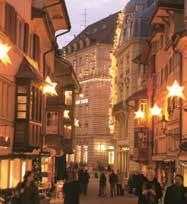
With the festive aromas of cinnamon and mulled wine hanging in the air, the sound of children singing carols and the spectacle of illuminated streets and ice rinks, there can be few annual events in Zurich that light up the senses more than the Christmas markets.

“Unlike the rest of Europe, where there’s usually one enormous, sprawling open-air market, Zurich is lucky to have six across the city centre, all within a five to 10-minute walk and all of which have an individual feel,” explains Martin Sturzenegger, CEO of Zürich Tourism.
“The biggest is in the big hall of the central train station, Hauptbahnhof. As well as housing around 150 festively decorated Alpine chalets, there are also more than 7,000 Swarovski crystal ornaments which adorn the huge Christmas tree – not to mention all the regular musical performances.”
Werdmühleplatz is another favourite, due to the unique attraction of the ‘Singing Christmas Tree’, where choirs (usually children) stand between the ‘branches’ to sing carols. “We all got to wear some really adorable outfits,” recalls Willis Griffiths, Class of 2013 (2001-2005). “I remember getting all dressed up and climbing up the tree to sing holiday songs. But the best part was coming down at the end and getting hot cocoa and joking around with all my friends.”
For Martin, the most exciting market is the newest one in front of the opera house. “With a much more urban feel, Weihnachtsdorf attracts the young and hip, with street food and out-of-theordinary, locally made gifts. There’s nothing like it anywhere else in Europe.”
Christmas markets originate as far back as the late Middle Ages, to enable townspeople to stock up on food and

12 | ZIS VOICES WINTER 2016/17
WORDS KATE HILPERN & MEGAN WELFORD / PH OTOS ALAMY
Above, clockwise from top left: Typical Christmas glass ornaments; Sechselaeutenplatz, Zurich’s newest Christmas market; late night Christmas shopping in Augustinergasse. Right: ZIS students perform in the Zurich Singing Christmas Tree.
“ The memories of those unique moments have stayed with me.”
Willis Griffiths Class of 2013
supplies to tide them over in the cold months. Over time, they were joined by craftspeople, eventually leading to the first authentic Christmas markets in Germany in the 1400s.

“In Zurich, they started around 20 years ago,” says Martin. “But people took to them quickly and they’re one of the rare events that attracts both locals and tourists. That’s a really positive thing.”
Helping to create the traditional festive scene are the low temperatures, says Martin, which usually range between 0-7 °C, but which can hit -10 °C.
“The city takes on a very special mood,” says Mirjam Villoz, Personal Shopper at Jelmoli, whose store is at the heart of the city centre on the Bahnhofstrasse. “Christmas starts for me when those lights come on; it’s such a special time of year and such a special atmosphere. It’s a festival of light and just a wonderful place to be.”
FIVE THINGS... to do in Oxford
Tristan Upton

Class of 2014 (2007-2014)
Studying
V ISIT – THE C OLLEGE S
Most tourists visit Christ Church but it’s £7 to get in and very busy. Most of the others are free or you just pay a £1 donation. As well as Jesus, Exeter, Balliol and Trinity, I’d recommend Wadham. It’s a traditional quad, with rooms around a grassy square, and it has a meadow where there’s an annual student festival called Wadstock.
S TROLL T H ROU GH – THE COVE R E D M AR KE T
The market is off the high street. It’s a great place to have lunch – try the Alpha Bar for rustic food with loads of flavour – then potter about the little independent clothes and souvenir shops. There’s a shop called Nothing and, just by it, Next to Nothing! There are great cake shops – it’s a real foodie place.
V ISIT – THE A S H M OLE A N MU S EU M
It’s the world’s first university museum and one of the oldest in the country. I’m not a history person but I found it really interesting. There are artefacts from periods like the Egyptians – sarcophaguses and mummified animals – and old maps and diagrams of Constantinople, which I loved because I visited Istanbul five years ago.
4. DO – PUN TI NG
Hire a Venetian-style boat from Magdalen Bridge and punt slowly down the River Cherwell to the Thames and back. You can fit up to five people in a boat but sometimes we hire a few and hold on to each others’ oars. It’s really relaxing just drifting along, although one person has to steer!
5. E AT – T HE GLOU C E ST E R G R EEN MAR KE T
Students and locals use this market five minutes from the town centre, off George Street. On a Wednesday there’s fresh fruit and vegetables at good prices and on a Thursday it’s cooked food, with global stalls like Thai and Greek selling delicious dumplings, noodles and pastries. On a Saturday, as well as food, there are clothes and antiques.
ZIS VOICES WINTER 2016/17 | 13 FACES / ON T H E LA K E. FIVE T H IN G S... Share your insider insights: #ZIStravels at facebook.com/zurichintschool
1.
2.
3.
L aw at O xford U niversity.
From top: Riccardo Sgorbini (Grade 7), spoke barely a word of English when he arrived from Italy three years ago. “But you must be heard, so I made myself learn. Now I think and dream in English” Amelie Creed (Grade 4) loves public speaking, although her favourite subject is maths. “Even just in class it’s important that you’re confident enough to put your hand up and answer questions”








14 | ZIS VOICES WINTER 2016/17
The art of pers uasion
The spoken word can change the world. So what is it that lifts speech to a higher plane? We talk to ZIS students, alumni and staff about their secrets of public speaking.


ZIS VOICES WINTER 2016/17 | 15 FEATURE / THE ART OF PERSUASION
WORDS LUCY JOLIN / PHOTO G RAPH Y NATO WELTON
Elsa Lemmila (Grade 6) says her first MMUN wasn’t as terrifying as she first thought. “Public speaking is a life skill – I don’t know yet what I’ll end up doing but I know it’ll be important that I can be persuasive and express myself properly.”




16 | ZIS VOICES WINTER 2016/17
Martin Luther King Jr had a dream. Elizabeth I had the heart and stomach of a king. Abraham Lincoln wanted government of the people, by the people and for the people. Words spoken aloud can resonate for many years – sometimes forever. So what is it that makes a speech – whether it’s in front of your class or to a crowd of thousands – truly effective?
Maybe the most important factor is confidence. Curtis Laitinen, Class of 1987 (1986-1987), is an architect specialising in healthcare. This involves consultation with sophisticated stakeholders – from doctors to administrators – all of whom may have very strong ideas about what will, and won’t, work. Consequently, Curtis says that the speaking skills he learned at AISZ – both as an actor in the drama group and a representative at the Model United Nations (MUN) – are vital to his effectiveness at work.
“A lot of my job involves bringing people together and working out how to organise a project, balance different opinions and persuade stakeholders that our way is the truly logical way,” he says. “And that involves persuasion and debate and being able to think on your feet. I learned about improvisation and the give and take of debate at MUN. You make your speech and then there are comments and questions. You have to defend what you just said and take the challenge back. That’s the value of public debate.”
For Upper School History and Philosophy teacher
Andreas Meitanis, the key to successful public speaking is really understanding and unpicking the format in which you have been asked to speak. Nowhere is this more apparent than at the MUN, to which Andreas has been taking students for 30 years. “At the MUN, it’s not enough to get up there and talk. You need to know the parliamentary procedure – how to phrase the questions, what to ask, and what is allowed. If you know this, you can play the game better and that makes you more confident to get up there and talk.”
Research can also prove crucial – not just in terms of finding the right information, but also as an insight into new issues and new ways of looking at an argument. At one recent MUN, students had to talk about the role of women in urbanisation. “At first sight, the topic looks a bit boring,” says Andreas. “But then, as students research, they realise there are so many issues to talk about. Why do women go to cities? To find work. What are the jobs? How do those jobs affect the lives of women and their children? What are their living conditions? These are real issues that have to be dealt with. I think many students are more mature when they return. They are now aware that these issues are not just for politicians.”
Akbarhon Muminov (Grade 10) agrees. “After identifying the status of the issue, and the nation’s stance, a delegate needs to write a resolution, which requires great problem-solving skills,” he says. “When writing that resolution, the delegate attempts to address the issue in an organised and effective manner. In the three conferences I have attended, I have written more than six resolutions, which have helped me develop these skills.”
of 1987
ZIS VOICES WINTER 2016/17 | 17 FEATURE / THE ART OF PERSUASION
“ A lot of my job today involves persuasion and being able to think on your feet –and I learned about improvisation and the give and take of debate at the MUN.”
Curtis Laitinen Class
(1986-1987)
A good public speaker also needs to be able to empathise. Social media marketing manager Amanda Fakhreddine, Class of 2006 (2000-2005), attended the Harvard Model Congress while at ZIS and was shocked to be assigned the role of a female Republican senator arguing against a healthcare reform bill. “I thought: that’s the opposite of everything my parents believe! I can’t be this person! But it was a really interesting insight into how to argue for the other side – to learn more about her positioning, where she was and where her experience had brought her. It’s definitely given me the experience and foresight to see both sides of the argument.”
Of course, mastering the art of persuasion is just the beginning. The real question is: what will you do with it? For Lara Chammas, Class of 2015 (2013-2015), the answer is surprising. Now a biology student at Imperial College London, at ZIS Lara took part in the MUN and hosted the TEDxYouth@Adliswil event in 2014 – which then expanded to become TEDxYouth@Zurich in 2015 – and, as a result, is a consummate public speaker.

“When I first started, I was very nervous about having to talk to some of these very important people and ask them to hand in speeches. But then I realised that we were all working at the same level. So now at university, I don’t feel intimidated when I ask my professors questions,” she says.

But Lara points out that being a capable public speaker is just as crucial outside the classroom, too. “If you want to do research, you have to be a good public speaker. You have to sit in front of committees to ask for grants, or if you want to get your research known you need to be able to talk to the media. Public speaking is not just for business any more. It’s something that’s taking over the world of science, too.”
Indeed, it’s unusual to find an area of modern life where public speaking skills aren’t essential. Business leader Geoffery Merszei, Class of 1969 (1966-1969), a member of the AISZ Board of Trustees (1992-96) and Chairman of the Board of Trustees in 1995/96, says that when he first entered corporate life, public speaking was not something he relished.
“I was frightened to death about giving speeches and presentations. Like being scared of flying, the best way to overcome this fear is to get on the plane and fly. And it’s the same with public speaking. I realised if I ever wanted to be a manager, I had to get up there and talk – so I forced myself to do it. People very quickly come to a conclusion about who you are and what you are by listening to you talk. So you’d better know how to speak with conviction.”
For Geoffery, gaining confidence as a public speaker stood him in good stead – he went on to become Executive Vice President and Chief Financial Officer of The Dow Chemical Company. But how did he hone his speaking skills? By observing the speakers around him – good and bad. Ronald Reagan, for example, kept his language very simple – but his power as a speaker lay in his presentation. “It never felt like he was talking to millions of people,
18 | ZIS VOICES WINTER 2016/17
“ People very quickly come to a conclusion about who you are and what you are by listening to you talk. So you’d better know how to speak with conviction.”
Geoffery Merszei Class of 1969 (1966-1969)
Alfons’ Blumenmarkt
Alfons Lutter, Inhaber Schlossgasse 14, 8003 Zurich




Switzerland
Tel. +41 44 450 28 83
Fax +41 44 450 28 86 info@alfonsblumenmarkt.ch www.alfonsblumenmarkt.ch

Alfons’ Blumenmarkt bei Jelmoli Seidengasse 1, 8001 Zurich
Switzerland
Tel. +41 43 497 25 50
Fax +41 43 497 25 50 jelmoli@alfonsblumenmarkt.ch
Alfons’ Blumenmarkt in Welle7 Schanzenstrasse 5, 3008 Bern

Switzerland
Tel. +41 31 312 04 00
Fax +41 31 312 04 03 welle7@alfonsblumenmarkt.ch www.alfonsblumenmarkt.ch

STUDY ABROAD
(Derek Bok)
We are proud to support ZIS’s ongoing commitment to enhancing educational excellence, and take pride in developing graphic design solutions for our valued clients. [
Adults, 50+, or holiday programmes for kids
German / English / French / Italian / Spanish
Conveniently located next to the Thalwil train station Gotthardstrasse 18, 8800 Thalwil 044 722 11 11 / infothalwil@castles ch www castles ch

IF YOU THINK EDUCATION IS EXPENSIVE,
TRY IGNORANCE
N OVA D ES I GN ]
• nova-design@bluewin.ch English Institute, Ltd. GERMAN, ENGLISH & FRENCH COURSES in Thalwil
levels A1-B2 and Beginners’ intensive courses
0041 (0)79 456 5929
Offering
Private and in-company classes upon request
IN THE CLASSROOM Growth planning
Teaching is a dynamic profession: just as we encourage our students to learn and improve, teachers too are always striving to hone their practice. That’s why, at ZIS, we use professional growth planning (PGP). It’s a process that helps our teachers move forward and challenge themselves.
There are four areas in which an outstanding teacher can grow: as an instructor, as a colleague, as a community member and as a teaching professional. At the beginning of each school year, every teacher identifies areas in which they can be stretched. Those goals might be individual or collaborative, and will support our school’s strategic orientation and goals.
For example, this year, one of my colleagues tried to find more effective ways of getting students to ask critical questions as her PGP goal. She chose to do this through structured literature circles – small groups discussing essential questions about the characters and the narrative of the novel currently being read in class. Critically, while this is a device used elsewhere in the school, this teacher had not done it before.
Having researched and rehearsed the technique, she launched it on the class and then used Visible Classroom, a teacher feedback tool, to assess success. This meant that the lesson was recorded and transcribed, and then the levels of interaction, engagement and critical thinking in the class were analysed. Visible Classroom looks at what the teacher says and the level of questions asked – are they surface level,
to check recall, or really getting under the surface of the subject? She also got feedback from me and other colleagues, and by the end of the year not only had her class benefited from a successfully implemented technique, but she was also able to share her learning and analysis with colleagues from across the school.
At ZIS we are lucky with our teachers. So professional growth planning is all about the next step – enabling teachers to make a real pedagogical change. My question is always: is this a challenge for you? If the answer is ‘no’, then it’s not a good PGP goal.
As a school, we’re moving from an evaluation and appraisal model towards saying: yes, you meet our standards. Now we want to give you responsibility for your own professional growth.
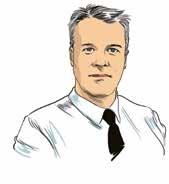
This is our third year of PGP planning. So far, the feedback has been that it’s pushing people out of their comfort zones and holding them accountable, and that it’s providing the right kind of support to meet our teachers’ goals.
It also encourages teachers to innovate. The value of trying something new outweighs the risk of making a mistake. And there is now a lot more sharing and collaboration. People are talking about their ideas and asking: who else has tried this? What are you planning? Can I come to your class and watch? The bottom line is that teaching and learning have become truly dynamic, ensuring that as a school, we are not sitting on our laurels but continually pushing for excellence.
ZIS VOICES WINTER 2016/17 | 41 NETWORK / IN THE CLASSROOM
“ Teaching and learning have become truly dynamic – we are continually pushing for excellence.”
David Wood Middle School Principal
Middle School Principal David Wood says professional growth planning is encouraging all ZIS teachers to rise to their own challenges.
Dr. med. dent. Alexander Dudic Dr. med. dent. Odyssia Houstis
Welcome to LAKESIDE KIEFERORTHO, your unique orthodontic center overlooking lake Zurich. The experienced and multi-lingual team (E/D/F) receives you warmly within the serene atmosphere of modern and airy facilities.
Applying the latest technologies and scientific research makes your orthodontic treatment a successful and most pleasurable experience. Please, feel free to consult us for a brighter, more cheerful future:

LAKESIDE KIEFERORTHO Seestrasse 71 8820 Wädenswil Dres med. dent. Alexander Dudic & Odyssia Houstis, MAS Tel.: 044.780.4404 · E-mail: info@lakeside-kieferortho.com
Women Back to Business For Women on the Move

Do you have an academic background and want to return to the workforce after a family break or to reposition yourself on the job market?
Duration: March 2017 until June 2018
Degree: CAS (Certificate of Advanced Studies) in Management of the University of St. Gallen
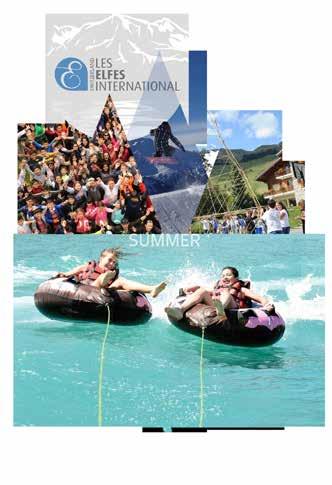
Information and registration: www.es.unisg.ch/wbb-en
patricia.widmer@unisg.ch
Phone +41 (0)71 224 75 35

INFONEXTEVENT 30 November 2016 2 February 2017 in Zurich www.es.unisg.ch/wbb-en
COMM U NIT Y S U PPORT Giving students their first experience of work
Every year, dozens of ZIS students take up internships across Switzerland – and many of those opportunities are provided by the ZIS community. But what is it really like to have a member of the ZIS community working for you?
Founder of online kids’ store littlehipstar, Ceyda Avunkuk (née Keyman), Class of 2001 (1987-2001), took on four student interns in 2015 and another four this year. “It’s a world away from one or two of the internships that I did, where you felt as though you were a burden and people were trying to find things for you to do – which were then often ignored anyway. Here, it’s about being a valuable member of an exciting startup.”

Ceyda ensures that students get real experience. As well as being responsible for website curation and updates, interns at littlehipstar attend meetings with brands such as Hunter, Converse and Vans. “And we take them to our warehouse in Germany
to see how all the picking, packing and logistics work. Interns also get to write up content for the newsletter,” she says.
“It feels good to give something back to a school that gave me so much – but the business also benefits from taking on responsible, hard-working and enthusiastic young people. Without fail, they walk in happy in the mornings, and they respect deadlines and go the extra mile,” she says.
Ceyda says she can’t recommend taking on ZIS interns highly enough. “If you give them the right tasks that make them feel part of your business, these youngsters hit the ground running. I’d take them on all year round if I could!”
ZIS students are interested in work experience in all industries. So if you are able to offer an internship, please contact our Internship Coordinator Dale Braunschweig at voices@zis.ch
ZIS VOICES WINTER 2016/17 | 43 NETWORK / COMMUNITY SUPPORT
WORDS KATE HIL P ERN
“ ZIS students hit the ground running. I’d take them on all year round if I could!”
Ceyda Avunkuk Class of 2001
Invisalign straightens your teeth discreetly and effectively within a short amount of time. Over 3 million successful treatments all over the world prove the effectiveness. Get to learn more about this modern way of teeth straightening.



Ihre Zahngesundheit. Unsere Kompetenz. Looking for a competent full service provider in dentistry? Visit us at swiss smile Zurich main station. Open 365 days. We offer the full range of dental services under one roof: General dentistry Aesthetic dentistry Full arch rehabilitation Orthodontics Paediatric dentistry Oral surgery Periodontology Prophylaxis & dental hygiene Dentistry free from anxiety Endodontics Dental implants swiss smile Zurich main station | 043 300 30 03 | info@swiss-smile.com | www.swiss-smile.com swiss smile unites experienced multilingual specialists of all areas of modern dentistry under the direction of Prof. Dr. med. dent. habil. MS Christian Stappert , who’s palmares includes former professorships at the NYU College of Dentistry, New York and the University of Maryland School of Dentistry. Show your smile, not your braces! Discover the invisible alternative to classic braces at our competence centre for Invisalign, Invisalign Teen and Orthodontics
Our expert Dr. med. dent. Marco Tribò is specialized in Invisalign for more than 15 years and owns diamond status for over 1’500 successful treatments. He is a member of American Association of Orthodontics, World Federation of Orthodontics and Fédération Francaise d’Orthodontie FFO. Visit us at swiss smile Zurich Enge. We will gladly advise you. swiss smile Zurich Enge, Splügenstrasse 11, 8002 Zurich | 044 202 67 22 | praxis@tribo.ch | www.tribo.ch
LIFE HACK Coping with a new language
Anneke Hoekstra, Class of 2009 (2001-2006), graduated from Northwestern University with degrees in secondary English education and French. She currently teaches English language and literature at the American School of Bombay in Mumbai.

B ODY LAN G UA G E IS EVERYTHIN G
Hand gestures, postures and even certain head and facial movements can have a very specific and useful meaning if you’re tuned into them. Newcomers to India are often perplexed by the ‘Indian head bobble’, which could mean either ‘yes’ or ‘no’. To this day I only have about an 85 per cent success rate on interpreting it. Rickshaw drivers – who provide much of the transportation for people around the city – have head movements that mean ‘Sure, I’ll take you,’ and ‘You’re out of luck, buddy.’ Or, if you interact frequently with someone who doesn’t speak your language, such as me with my doorman, you can invent your own gestures and body languages. Ours have gotten intricate enough that he knows when I’m really tired and I know when he has a package for me. We even have one where he tells me that I got back from my run too quickly, and that I should run around the building a few times to finish.
S URROUND YOURSEL F WITH NATIVE SPEAKERS
Most Indians are bilingual, so a new friend means I have a new Hindi teacher. Making local friends is not only key to understanding the culture you’re in, but can be a really useful way to pick up new words and phrases. You’re much more likely to learn the contemporary usage of something from a person than in a more formal setting. And sometimes, when they dive into the language you’re learning, you can just sit back and listen and try to soak it up.
L EARN EVERY DAY
Keep a little notebook – or a note on your phone – where you can write new learnings down. I have a running list of new Hindi words and phrases that I add to whenever I get something new for my

linguistic arsenal. I write things down phonetically because I’m writing them in the wrong alphabet anyway, and this way I can remember how it was supposed to sound later when I’m glancing at it. It’s also important to find time in your routine to ‘study’. Whether it’s going back into your phrases notebook, practicing with a new friend, or using an app like DuoLingo, it’s important that you’re making an effort to keep what you’re learning fresh in your mind, especially if you’re attempting to learn the alphabet.
D ON ’ T WORRY ABOUT SOUNDIN G SILLY
If you’re an adult learning a new language, there’s a good chance you won’t pronounce all the sound combinations that are being thrown at you and your well-formed linguistic palette perfectly. I struggle with this one. I often want to sound perfect and don’t want to be laughed at if I mispronounce things. In Hindi, there’s a whole variety of aspirated consonants that we do not have in English. The difference between using one and not using one can be the difference between asking for change and saying something pretty vulgar. Despite these potential mishaps, you should still try your best to pronounce things properly, but you shouldn’t sweat it if you aren’t perfect.
ZIS VOICES WINTER 2016/17 | 45
NETWORK / LI F E HACK WORDS L
ILLUSTRATION
E
UCY JO LIN
AN D RE W JOYC
ATHLETICS AN D A CTI V ITIES (ATAC) Music
Vibrant, noisy and full of inspiration. The music scene at ZIS is very much alive and kicking, giving students a passion for life.

Learning to play music is one skill: having the confidence and ability to bring it alive in front of an audience is quite another. That’s why at ZIS, performing is an integral part of the music curriculum. “I have always felt that while teaching performing music I was essentially teaching self-confidence,” says Stephen Sager, Music teacher between 1991 and 2003. “Many young singers who were shy about performing alone became soloists in their senior year.”
It’s the performances that provide the high points for both staff and students. “In 1999, the high school choir performed an eight-part motet [sacred choral music] I had performed in college, as well as Vivaldi’s Gloria, with a chamber orchestra, in a church in downtown Zurich,” remembers Stephen. “In 2000, they performed Mozart’s Requiem there. This was the proudest accomplishment of my teaching career.”
For current Middle School Music teacher Bill Gilfry, concerts are the highlights of the musical year, whether it’s a group of Grade 4 students giving their first performance in front of the school, or the ZIS students chosen to play at the Association for Music in International Schools (AMIS) festivals.

“The Bands Together concert is always one of our favourite events, as that’s when we get the Middle School bands to play with the Upper School bands,” he says. “This year we had around 140 kids on stage playing a range of pieces, from Minnie the Moocher to the Zürcher Sechseläuten-Marsch.
“The power and energy of having that many musicians is just terrific. This year we did the same thing with the string players – we called it the String Fling.”
46 | ZIS VOICES WINTER 2016/17
Perfect pitch Students at Z I S enjoy music as part of the curriculum up to Grade 6, after which they have the chance to explore more specialised learning.
WORDS L UCY JOL IN PHOTOG RAPHY NAT O W ELT O N
Standards are high. Last year, 17 of the 80 places in the AMIS festival hosted by the American International School in Vienna were won by students from ZIS. “They have to audition for these places, so to get a place requires a lot of perseverance and problem-solving,” says Bill, who sits on the AMIS executive board. “The kids who get in make a tremendous amount of progress.
“It’s the most intensive time of practice they will have all year. Once they are in the group they will also get to play at higher levels with kids who have attained that same skill level, meaning that they can also gain insight into elements like balance, pitch and color. So it’s a very enriching experience. Kids come back very inspired and happy.”
Musical education is a feature at all levels of the school – part of the curriculum up to Grade 6, after which it becomes optional. Initially, children have general music classes, through to more specialised learning at Middle and Upper School, where they may cover music theory, composing everything from film scores to raps and working together as an ensemble.



Martin Kessler (Grade 12) has certainly made the most of opportunities to perform at ZIS. He’s been a member of the AMIS Honor Vocal Jazz ensemble for the last three years, and the Honor Men’s Choir in 2016. “I’ve been involved in the concert band all throughout high school, and tons of shorter commitments along the way – preparing for and participating in AMIS festivals for both trombone and voice, pit orchestra for school productions, Battle of the Bands and, more recently, jazz band,” he says. “I also started a four-piece band that I’ve been playing with since last year.”
Martin’s music has already taken him to performances all over the world, including AMIS trips to Bejing, Doha and Singapore – and he says that’s just the beginning. “I’m going to continue doing everything I can to be involved in music at the school and also try applying to some music schools. My experiences with AMIS will stick with me, not just because they all helped me improve as a musician, but also for the cultural experience of meeting kids from all over the place. Without the support of teachers and musical opportunities I’ve had while at ZIS, I wouldn’t be where I am as a musician or a person today.”
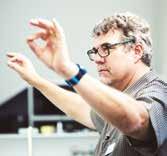
NETWORK / ATAC ZIS VOICES WINTER 2016/17 | 47
“ This year we had 140 kids on stage; the power and energy of having that many musicians is just terrific.”
Bill Gilfry Middle School Music teacher
CLASSNOTES Alumni news
Megan Hall
Class of 1997 (1995-97)
Winner of the E nglish Prize at her graduation from AI SZ, Megan has just completed her PhD in E nglish L iterature at the University of N otre Dame in I ndiana.
Sara Nilsson
Class of 2009 (2007-09)
Congratulations to Sara and Will Lawrence (Class of 2010 (2004-10)) who married in Skärhamn, on the Swedish island Tjörn.

Katherine Walwyn-Brown
Class of 2010 (2005-10)
Diana Kurlack, née Hines
Class of 1966 (1963-65)
Diana was part of the first-ever year at AI SZ and is now happily retired in A rizona, US A . She has, she writes, the “sweetest memories of AI SZ’s beginnings – a glint in a few parents’ eyes has become a beautiful legacy. Kudos to all who made that happen.”
Pascal Stalder
Class of 1978 (1973-74, 1976-78)
Kate is proud to say she’s currently doing her PhD in I mmunology at the University of Manchester in the UK. R ead her blog at https://immunityandbeyond.wordpress. com/about/
Sara Julia Ljeskovac
Class of 2011 (2005-11)
Sara has just written and illustrated a children’s book The Wizard and the Hat, (www.saraljart.com) and writes to thank “the lovely” Ms Walentuk for inspiring her.
Charli and Brett Morachnick
Class of 2016/18 (2007-2013)
Perfect day: Claire (née Poolman, Class of 2004) and Stuart Roscoe (Class of 2004) celebrated their wedding this summer, attended by some of their Z I S friends from across the world. Guests, left to right, were: Matt Wright (2006); Louise Broedelet (2004); Carlo Terruzzi (2005); John Hendren (2006); Fred van den Berg (2004); Jen Poolman (2007); Claire and Stuart; Imogen Roscoe (2010); Kris Paasila (2004); Chantal Versluis (2004); Alec Zimmermann (2006); Lauren Hendren (2004); Nikki Jacobson-Zaytsev (2004); Katie Corwin (2003); Paul Fox (2004).
Pascal is in touch to tell us he’s working in Boston for John Hancock I nvestments and met up with members of his 1978 class earlier this year.
Chuck Kruger
Former faculty (1966-1990)
To find out what this self-styled “old geezer” has been up to recently, and what it’s like to become a writer/would-be poet and broadcaster, check out his website at www.chuckkruger.net
Irene Shepherd
Former faculty/staff (1987-1992)
I rene has just had her book, On a Bicycle Built for Two, published, detailing a 12year, global and “unconventional” adventure on a tandem with her partner.
Good luck to Charli and Brett as their family relocates to Tokyo, Japan – Brett to the A merican School in Japan and Charli to Pace University in New York, USA
Maya, Adam and Galeela Shereen
Class of 2018/2021/2026 (2016)
The Shereens would love to hear from friends via alumni@zis.ch
Ignacio Benito
Class of 2020 (2008-11)
I gnacio was a student at Baden campus from its first year and would like to hear from any of his peers (via alumni@zis.ch).
We'll print a selection of your updates in either our Classnotes section here or our electronic newsletter, Alumni Links.
48 | ZIS VOICES WINTER 2016/17
NETWORK / CLASSNOTES
If you have news or updates to share, email us at alumni@zis.ch
because his eye contact was incredible,” Geoffery says. “He had that ability to connect with his audience through a camera lens like nobody else. He spoke to the camera as if he was talking to a dear friend. We can’t all be like Ronald Reagan but we can try to anticipate what the audience is interested in. It’s not what you want to talk about, it’s what they want to hear that matters.”
ZIS’s current crop of students are taking the power of public speaking forward, emboldened by the confidence and inspiration it can give. When Elsa Lemmila (Grade 6) first spoke at the Montessori Model United Nations (MMUN) in Rome, she admits that she was nervous. But, she says, the more she got used to it, the less worried she became. She’s now had numerous opportunities to speak in front of parents, students and teachers at ZIS, giving her valuable skills as well as new insights.

“My experience at ZIS has taught me that if you have researched properly and know what you will be talking about, it gives you more confidence,” she says. “I have grown to like public speaking more than I expected, because of my positive experiences. I think it’s important that young people should learn how to speak publicly because it is a skill you might need to persuade people to take action for good in the world.

“Martin Luther King Jr made amazing speeches about freedom and rights for black people. He needed to be confident about speaking in front of thousands of people. A lot of people may think that they could never be like Nelson Mandela or Mahatma Gandhi, but it doesn’t matter. Small actions matter too, meaning a small impact – a small speech to a handful of people – can be just as important as a big one.”
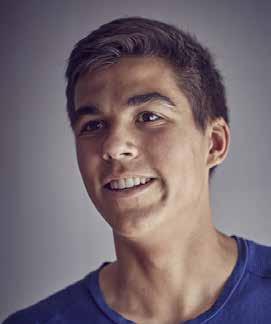
FEATURE / THE ART OF PERSUASION ZIS VOICES WINTER 2016/17 | 19
André Fialho da Silva (Grade 12) thinks it’s important to be able to understand the intracacies of all sides of an argument and argue around it. “But you need to be prepared and to be able to think on your feet.”








1293 days of worldwide travel
22 locations in Switzerland H globetrotter.ch Travel is our profession. Personal advice our passion . 02-2242 Imageins_ZH-InternSchool_181x122.indd 1 22.09.16 16:34 apartment with a generous terrace area, contact Specogna Immobilien, Jeannette Kostelnik. Tel.: +41 (0)44 804 40 40 Everyday feels like vacation living alongside the lake in Horgen. Worksh o p
Claudia Meyer
experience



Language schools worldwide A linguistic and cultural immersion into French, Spanish or German? Combine language learning with leisure! Book your language learning experience now and learn your dream language where it is spoken. 0800 855 875 eurocentres.com with keyword zis2016
A fluctuating Swiss franc
Switzerland has always been a financial safe harbour. So how should we respond to the fluctuations of the Swiss franc? We ask industry experts from the ZIS community for their thoughts.
David Cole (alumni parent) Chief Financial Officer, SwissRe
Kristof Terryn (current parent) Group Chief Operating Officer at Zurich Insurance Group



When people get worried about the state of the world, they buy Swiss francs, which is why the currency keeps appreciating. Often too much is made of these variabilities or that the Swiss franc is strong. All currencies fluctuate, and the Swiss franc keeps fluctuating up. But how much it affects you very much depends on your frame of reference. If you’re being paid in Swiss francs it works well to take vacations abroad, and buying things outside of the country becomes greatly advantageous. If you relocate your business here it might be more painful.
At its core, the reason why the Swiss franc is a strong currency is because the public finances are sound. The governmental bodies, the municipalities, the cantonal governments – they all balance their budgets. They spend the money they have received from taxation, and there are only slight variations away from that. Borrowing makes up a relatively small proportion of spending.
By contrast, countries like the US and in Western Europe live in a state of constantly borrowing more than they have, with politicians overpromising what they can do. That’s how currencies gets debased. It’s wonderful to live in a place that operates within its means.
Excessive overvaluations of the Swiss franc have typically been related to periods of high risk in the world economy, which lead to ‘safe haven’ flows. As the environment remains quite risky, it cannot be ruled out that the Swiss franc will appreciate again or that the Swiss National Bank will have to intervene heavily to prevent excessive overvaluation.
The Swiss franc has been on an appreciation trend for a long time, and Swiss exporters have reacted to this by continuous improvements to their competitiveness, a rigorous focus on quality and specialisation in profitable niche segments.
However, when the Swiss franc appreciates very rapidly in a very short time, this tends to cause disruptions. Swiss exporters are still digesting the impact of the rapid appreciation of early 2015. The gradual depreciation of the Swiss franc since then is certainly welcome, but is not sufficient to take the pressure off completely.
There are sectors of the Swiss economy that have suffered more significantly, such as tourism and hospitality. The expensive Swiss franc has clearly had a negative impact on their competitiveness with similar sectors in surrounding countries.
In early 2015, before the Swiss National Bank removed the minimum exchange rate of 1.20 CHF/EUR that was set in September 2011, the euro had depreciated significantly against the US dollar and seemed set to fall further.
Tying the Swiss franc’s fortunes to those of the euro was no longer tenable, as foreign exchange reserves had become very large and losses from inappropriate foreign exchange intervention could have been substantial.
The Swiss franc is deemed a safe haven currency, while the Swiss economy is relatively small – which means the impact of any global instability will be felt more acutely.
The good news is that Switzerland’s manufacturing base tends to be highly skilled, selling products that are hard to substitute. In combination with a dynamic approach to productivity, the Swiss economy has demonstrated resilience despite the strength of the Swiss franc. Recent trade balance figures show that exports have been strong.
Nevertheless a CHF/EUR exchange rate of around 1.10 remains challenging for many companies, especially for the retail industry and a domestic tourism industry that is heavily dependent on European guests.
22 | ZIS VOICES WINTER 2016/17 WORDS ANASTASIA HANCOCK. ILLUSTRATION A NNE - L I K A R LSSON PER
SP EC TI VE S
Guy Spier (current parent) Founder Aquamarine Fund, author of The Education of a Value Investor
Anna Nunziata (current parent) VP Financial Planning & Strategy, Head of Business Control EF Education First

Among internal and external factors affecting the value of the Swiss franc, the health of the Swiss economy is, of course, a key internal factor, as are interventions from the Swiss National Bank. An important external factor is how attractive the franc is as a safe investment in times when other currencies are weakening. The more attractive the franc seems as a hedge against the risk of other currencies, the stronger it will be. For an export-reliant economy like Switzerland, a strong currency is not helpful. It is especially difficult for companies that produce goods or services in Switzerland.
Many expats still recalculate Swiss franc prices into their home currency, so from January 2015, the weekly grocery shopping seemed even more expensive. However a salary in Swiss francs fluctuates the same way.

In the medium term a strong and potentially volatile franc means that Switzerland loses competitiveness as an operational base for international companies. Corporations may pay lower taxes in Switzerland, but the high salaries and increasingly stronger Swiss franc may still make other places seem more attractive to companies from a pure cost perspective.

FEATURE / PERSPECTIVES ZIS VOICES WINTER 2016/17 | 23
“ The good news is that Switzerland’s manufacturing base tends to be highly skilled, selling products that are hard to substitute.”
Kristof Terryn Group Chief Operating Officer, Zurich Insurance Group
GRAND DESIGNS
When the American International School of Zurich opened in 1963 it was as a result of extensive efforts behind the scenes.
 WORDS WILLIAM HAM BEVAN / PHOTO G RAPHS NATO WELTON
WORDS WILLIAM HAM BEVAN / PHOTO G RAPHS NATO WELTON
When starting at a new school, students can expect to have some gentle settling in time before lessons begin. But in the fall of 1963, the first students at the American International School of Zurich had a rather more hands-on experience. Working alongside their parents and teachers, they helped clear the grounds, build their own classroom furniture and place the textbooks on the shelves.
Don Bowden was one of the original staff members at AISZ, with responsibility for teaching all the social sciences. He says: “That story has become part of the school mythology, but it’s all true. Everyone certainly lent a hand – and in some cases a screwdriver or wrench – in making it happen. It really was remarkable how much of a unity we were: teachers, parents and students, all establishing the school.”
Forty-three boys and girls passed through the doors of the Spinnergut Villa on that day. Among them was Creighton Smith, Class of 1967 (1963-67). “We felt

as though we were the pioneers,” he says. “It was like being part of NASA’s Mercury program – the first seven astronauts. That first day was just giddy. Most of the parents were there, and my dad was running around taking photographs. And we were just thinking, wow, how did we manage to make all this happen?”
In fact, it was the realisation of a plan first hatched over a game of bridge, according to another of the original students. Barbara Fake Shangle, Class of 1965 (1963-1964) had been attending a French lycée while her father, Roy Fake, worked for The Dow Chemical Company’s European distribution centre in Zurich. She says: “I remember my father saying there was an enclave of Americans who went to this international church, and they would get together on occasion to have dinner or play bridge.
“All of them started to say that we needed an American school – something to get the kids back on track before they went back to the States for college. That was where the whole concept began. My father was the first chairman of the
board, and my mom, Marion, and Mr Smith were two of the people who found the villa – they did a lot of research.”
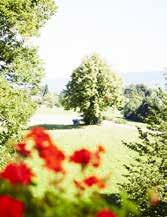
THE PERFECT SITE
Robert Smith, who had brought his family to Switzerland to open the first European office of Stanford Research Institute, involved his son in the search for a campus. On one scouting trip to Kilchberg, Creighton first set eyes on the Spinnergut Villa and immediately knew it would be the perfect site. He says: “I’ll never forget that day. We walked up to the villa, this beautiful place, and I just said, ‘Dad, this is it – it’s got everything.’”
While working through the immense practicalities of opening a school, the parents secured support and financial backing from the international companies in which they were employed. This proved essential to the scheme’s success. Creighton says: “When we ordered textbooks, one company would say, ‘OK – we’ll cover the cost,’ and another would say, ‘We’ll see it’s delivered in a week.’ Remember, it could take two weeks just
FEATURE / G RAND DESI G NS ZIS VOICES WINTER 2016/17 | 25
Opposite page: The Spinnergut Villa in Kilchberg. Below left to right: View from the Principal’s balcony; the villa’s main staircase.
to get an airmail letter from the United States in those days.”
The closeness of the AISZ community gave rise to a unique ethos. Don Bowden, whose wife, Joan, also joined the school as librarian, recalls: “We lived in a little town close by, and we had a number of parents as neighbours. It was always, ‘Come over – we’re all friends’. There was less of the formality that you see in many schools today, where it’s all strictly delineated. We were part of the family.”
The diversity of both the student body and the teaching faculty also shaped the spirit of AISZ. The staff, under the leadership of headmaster John Mattern,

made up a cosmopolitan group. Like many other teachers, Don and Joan had worked elsewhere in Europe, coming to AISZ from a school in Athens. And even during the first year, trips to other nations were deemed a vital educational experience. Few who were present have forgotten the excursion to Berlin, at the height of the Cold War, just a few months after the assassination of President Kennedy. “To go to the Wall, where Kennedy had spoken – for me, that was huge,” says Creighton. “Mr Bowden, and all those like him who helped us to further our experience in Europe, were treasures.”
Don Bowden says: “Above all, we established an attitude towards acceptance of diversity, not exclusion. The student group was a fascinating mixture of Americans, Brits, Canadians, Germans, Swiss and others.
“I’d say the school was as much European as American: we had perhaps 20 different countries represented in those first three years. Today, of course, there are many more.”
The founding principles of AISZ were perpetuated when it merged with the International Primary School of Zurich in 2001. Philip Ryan was Chairman of the Board at the time, spearheading a successful campaign to raise funds for the new Zurich International School.

Like many others, he was determined that the ideal of a school community –and a community school – should be preserved. “With an international school like AISZ, the headmaster doesn’t just lead the school; he’s like the mayor of a town,” says Philip. “All the expatriates orbit around the school. The parents of your kids’ friends become your friends. Everybody’s involved in the school –doing all kinds of things to enrich the kids’ education.
“I had business friends and a few local friends, but almost all our close friends were involved with the school. It becomes all-encompassing: everyone’s emotionally involved. The community is completely interwoven.”
26 | ZIS VOICES WINTER 2016/17
These pages, left to The exterior of the villa; wooden bannister detail; trophies from the Middle School entrance hall.
is founded at the Spinnergut Villa in Kilchberg, a former family home built in 1914.
The English Language Kindergarten opens. By 1979 it moves to the Naville Villa in Kilchberg (current ECC) and in 1980 becomes IPSZ.
AISZ achieves dual accreditation from two leading education accreditation bodies for international schools, the NEASC and the ECIS.
The International Baccalaureate is introduced, offering students a choice of curricular pathways in addition to Advanced Placement courses.
AISZ and IPSZ merge to form Zurich International School. The purpose-built Lower School opens in Wädenswil a year later.
A new state-of-the-art Upper School is opened in Adliswil. The Spinnergut Villa now becomes home to the Middle School.
In its 50th anniversary year, ZIS is now attended by more than 1,450 children. Alumni from around the world return for the celebrations.
The merged school immediately faced a major problem: an acute lack of space. And, as in 1963, it was again thanks to the community of parents that it found a temporary home.
Philip says: “The board went out to the parents and said, ‘Keep your ear to the ground – we’ve got to find a block of space we can rent for two to three years.’ Sure enough, one of my contacts found a building that was being abandoned by Credit Suisse. That rescued the school. I literally don’t know what we would otherwise have done.”
AMAZIN G PERIOD OF CHAN G E
During his time as chairman, Philip helped guide the school through its greatest period of transformation –and did so with the help of a great number of volunteers from all parts of the school community.

Most importantly, he played a leading role in the successful campaign to fund the new Upper School, which opened its doors in 2008 with money raised from big corporations and the community.
He says: “With the planning and fundraising for the new high school, it was an amazing period of tremendous growth and change. The business community in Zurich was just exploding.”
Michaela Seeger, who co-chaired the fundraising committee with Philip, and is now Director of Community Relations, says: “That sense of all of us working together to make ZIS better is something
that has been passed on from those early years and is still prevailing today.
“The community is amazingly generous in giving its resources of both time and money. In 2008, this generosity made it possible for us the open the new Upper School. This year, we were able to fund the new community centres, The Den and Den Jr. This spirit impacts the experience of all of us, whether we are students, alumni, parents or employees. We all benefit from it.”
A number of initiatives have helped to strengthen the links between the present-day ZIS and its distinguished past, including the well-attended alumni events held in Switzerland and around the world – including a 2013 reunion in Zurich to mark the 50th anniversary.
At the event, Creighton arranged for the installation of the plaque that can now be seen in the entrance to the Spinnergut Villa. Its tribute to the founders states simply: ‘They gave us the world’.
“That time was so special,” says Creighton. “Those parents came together and did that for us. ZIS students were, and continue to be, the luckiest kids in the world.
“I have so much pride when I go back, and I know that my dad did. He’d often say, ‘That school was really something.’ Like all of those other parents, he felt he’d done something quite fine. And he had nothing but praise for the people who came after him and built on it.”
FEATURE / G RAND DESI G NS ZIS VOICES WINTER 2016/17 | 27
“
E verybody’s involved in the school, doing all kinds of things to enrich the kids’ education.”
Philip Ryan Chairman of the Board (2002-2004)
HISTOR Y 1963 1970 1971 1999 2001 2008 2013
TIMELINE OF THE SCHOOL
The American International School of Zurich (AISZ)

28 | ZIS VOICES WINTER 2016/17
SPARKY. ADVENTUROUS. COMMITTED. MEET THE NEW INTERNATIONALISTS
What does it take to become an international school teacher? Voices talks to the people who know.
Sparky? Check. Adventurous? Check. Committed? Check. Outstanding educator? Naturally. In fact, spend any time in their company and it quickly becomes apparent that people who chose to become international teachers offer something just a little bit different.
“You’ve got to have a personality that’s willing to feel a little uncomfortable,” says Alison Callaghan, grade level leader and Upper School Biology teacher. “And you have to be happy to adapt.” She should know. After working as a teacher in a public school in downtown Toronto, Alison made the bold decision to move with her husband (then undertaking PhD research) to Namibia.
Her classroom was a shipping container with windows cut out of the sides. She had no access to traditional scientific equipment, so found herself using what she could source at the local hardware and grocery stores, and having to design a science programme from scratch. “In my career it was the most creative and resourceful I’ve ever had to be. In the local school there were 50 students to one teacher, and children could never touch anything – text books, experiments or equipment. That was the first thing I changed. Everything became exploratory. I wanted to explain scientific concepts in a hands-on way. I remember in the beginning they were
so apprehensive. By the end they were making rockets out of milk canisters and doing lots of simple hands-on science. I could see them start to embrace scientific questioning.”
As well as finding it a very enriching experience, Alison says it really helped her identify how she wanted to teach in the future. “In such big classes there could be no relationship. You couldn’t get to know what sparks individual curiosity, what their strengths and weaknesses are, or be able to solidify the idea of the student as a whole person. I realised just how important these things were to my idea of what teaching should be.” But then that’s the thing about international teachers – their unique experience enables them to choose the best of what all cultures have to offer.
CRITICAL THINKIN G
In fact, as Ben Marcus, Middle School Humanities teacher who previously taught at an American high school in the deserts of Arizona, points out, the very fact of having an international outlook is a key skillset if you want to teach students from all over the world. “My whole approach to teaching is about engaging students in the world they live in, with the intent of helping them to think critically about our similarities, differences, and connections. Understanding different
FEATURE / THE NEW INTERNATIONALISTS ZIS VOICES WINTER 2016/17 | 29
WORDS ANASTASIA HANCOCK
IL L USTRATION MICHAEL KI R KHAM
perspectives is key to achieving a global knowledge that accepts other viewpoints – something you can’t miss as an international teacher!”
One of the most important characteristics of an international teacher, he says, is to be able to bring together students with different backgrounds in a way that serves to augment their own educational experience. “Everybody’s own history is the most important history in their world, and we all need to understand we have a common condition that trumps all these specifics – it’s called being human. So I look for what I call universal connectors – music, food, sport, hobbies, anything really that helps make connections across cultures.”
HI G H E X PECTATIONS
Grade 4 teacher Jessica Bruno first became part of the international teaching system in 2011 when she moved to the Bahamas to be closer to her boyfriend (now husband) who was working in Nassau. “It was unlikely for me to get a job in the public system as I was not a Bahamian national and therefore I began looking for alternatives,” she says. “I was fortunate enough to get a job at one of the two international schools on the island, and during an accreditation review by the International Baccalaureate (IB) I was asked to co-chair a review committee. That was when I learned so much about what makes an international school tick, and the high expectations they must live up to. I knew that it would be impossible for me to go back in to the public system in any country.”
But while there are many inherent benefits of working and studying in an international school, recent research shows that there is an increasing
shortage of international teachers worldwide. Not only does it take a special person to succeed, it takes outstanding schools to tempt teachers to go international. Personal and professional growth, while important in any career, is often a major factor, so it is not surprising that it forms a core part of ZIS staff recruitment.
Professional growth plans are set at the beginning of the year, and teachers work closely with an administrator to ensure they are achieved. As well as a supportive critical friends group, the ZIS professional development pilot group in 2015/16 worked to ensure teachers are as well supported as they can be. Jessica, along with colleagues Alison and Ben, was one of the group’s members. “From the moment I entered ZIS as a prospective employee, I felt welcomed and supported,” says Jessica. “It was such a refreshing feeling to know that I was valued and that someone would take the time to share their pride of the school with me even before I was hired. And I’m so grateful that that support and guidance has continued.”
Support like this is essential for teachers’ professional progression, and allows them the freedom to advance their own teaching skills. For example, project-based learning is a relatively new method of teaching in the school, and one that is delivering great results. Of course, a new approach inherently involves an element of risk, but teachers feel supported enough to take it on. “I know myself it comes down to risk taking – being willing to fail and to learn from it, which is ultimately what we’re teaching the students to do,” says Alison. “We’re modelling our daily actions to create an environment where children are also willing to have a go.”
Jessica agrees, and says that teacher empowerment is key. “Empowering one another, be it teachers or students or friends, allows us to grow as a community and create the change we want to see in the world. It should be circular – and we’re particularly lucky that as teachers, when we feel empowered we have the ability to empower children and therefore the future.”
For Sarah Burnham, who was also in the ZIS professional development pilot group, the challenge of retraining as a teacher meant juggling working, studying and being a mother, but she was inspired by the way her own children had developed at ZIS. Currently a multi-age teacher in the Early Childhood Center she says she has thrived since becoming an assistant teacher at the very beginning of her employment at ZIS when she was mentored by her son’s then teacher, Rob Caramella. “I have been very grateful for the many professional development opportunities ZIS has offered me, from financial help with my studies, to conferences, courses and workshops both within the school and abroad. Whenever I have expressed an interest in further developing my craft, I have been encouraged to discuss my goals and given support to find the best way to achieve them.”
And for those willing to take the risk and make that commitment, the rewards – both professional and personal – can be enormous. Alison says that becoming an international teacher has been “the best decision of my life”. And Ben agrees. “Like any school, it is the faculty, staff, and students who ultimately define the experience as a whole – and the experience as a whole is remarkable. Every day I have reminders of just how lucky I am to be here.”
30 | ZIS VOICES WINTER 2016/17
“ It’s called being human. I look for what I call universal connectors – music, food, sport, anything really that helps make connections across cultures.”
Ben Marcus Humanities teacher [Middle School]
Previous page: Alison Callaghan, Upper School Biology teacher – via Toronto and Namibia.
Right: Ben Marcus, Middle School Humanities teacher, who says his experience has been “remarkable”.

FEATURE / THE NEW INTERNATIONALISTS ZIS VOICES WINTER 2016/17 | 31
Grand Tour of Switzerland.

If you want to discover the best of Switzerland in one single route, look no further than the Grand Tour of Switzerland, which stretches for more than 1,600 kilometres and whisks you through the country’s most beautiful regions. You’ll encounter four linguistic regions as you take in five Alpine passes, 11 UNESCO World Heritage Properties, two biosphere reserves and 22 lakes. Enjoy an unforgettable journey packed with adventure from start to finish!
MySwitzerland.com/grandtour


















D F
Grand
Switzerland Autobahn Hauptstrasse Bahnlinie Autoverlad
www.swisstravelcenter.ch 0 20 40 80 km 0 10 20 40 miles
Tour of
Flughafen
The Grand Tour is signposted in a clockwise direction.
The Grand Tour of Switzerland is a suggested route that makes use of the existing Swiss road network. Visitors follow the route at their own risk. Switzerland Tourism and the Grand Tour of Switzerland association accept no liability for construction works, diversions, signage relating to special events or safety provisions along the route.
Matterhorn, Zermatt, Valais
Creux du Van, rock amphitheatre, Jura & Three-Lakes
Swiss Alps Jungfrau-Aletsch, Bern-Bernese Oberland / Valais
Jet d’eau, Geneva
Château de Chillon, Montreux, Lake Geneva Region
Chapel Bridge, Lucerne, Lucerne-Lake Lucerne Region
Old Town of Bern, Bern-Bernese Oberland
Basel, city of culture, Basel Region
Grand Train Tour of Switzerland.

The Grand Train Tour of Switzerland represents the very best of Swiss public transport and can be enjoyed all year round. And best of all you need only one ticket – the Swiss Travel Pass. It covers trains, buses, boats and 75 city transportation systems. It also provides access to over 480 museums. With the Swiss Family Card children under age 16 travel free of charge when accompanied by at least one parent. For more information see SwissTravelSystem.com/grandtraintour
More Information.
Travel within Switzerland

Convenient, comfortable and carefree: a dense public transport network and optimal connections guarantee flexible travel and enjoyable explorations throughout Switzerland.
MySwitzerland.com/travel
Switzerland Travel Centre
No one else give you so much Switzerland as STC! Their incoming services: Online hotel booking, FIT packages, group holidays, scenic rail journeys, MICE and affiliate programs. www.switzerlandtravelcentre.ch




Booking accommodation





From design & lifestyle hotels to wellness retreats and farm stays: Switzerland’s accommodation options at a glance. With, of course, an easy and convenient booking facility.




MySwitzerland.com/accommodation

March–OctoberWinterFri/Sat/Sun 02040 80 km 0102040 miles A FL I 02040 80 km 0 10 20 40 miles Grand Tour of Switzerland Grand Train Tour of Switzerland Motorway Main road Railway Car transport by rail Airport
Locarno, Promenade along Lago Maggiore, Ticino
Grossmünster church, Zurich, Zurich Region
Rhine Falls, Eastern Switzerland /Liechtenstein
Grand Tour of Switzerland Grand Train Tour of Switzerland Motorway Main road Railway Car transport by rail Airport
Muottas Muragl panoramic peak, Graubünden
A LIFE UNPACKED
After months of planning and weeks of packing, you’ve arrived. But what happens next? We talk to ZIS families, old and new, about those evocative first days.
Everyone remembers their first week in Switzerland. The challenge of packing is replaced with the even greater chaos of unpacking. The proposed shopping trip for ‘a few essentials’ turns into a whole afternoon of mild panic and confusion. The novelty of an extensive public transport system enables you to get lost – in four languages.
Over time, the newness of it all recedes, until one morning you wake up and realise that your children routinely move between languages, that your family’s social life seems to revolve around trips to the slopes and that you only ever get the fondue set out for visitors. You are at home. But how did you get here? For most families, it is the parent at home who carries most of the
34 | ZIS VOICES WINTER 2016/17
WORDS MEGAN WELFO RD
PHOTO G RAPH Y NATO WELTON

load: as family fixer, organiser-in-chief and maker of a new home. And in that first week, it is often the practical details that prove the most overwhelming. “Two days before arriving, we’d been on the beach in 41 degree heat,” says Australian Renae Raba (current parent). “And here it was heavy snow. The kids had never seen it before – everything was white. We were scrambling for snow boots and pants and had to ask our neighbours where to go. Food was difficult too – I was trying to recreate dishes from home and it wasn’t quite working. And driving was a big adjustment. I got beeped for going too slowly, I gave way to everyone at roundabouts, I put on windscreen wipers instead of indicators, I didn’t understand the road signs.”
And in the middle of it all – from the oven you can’t turn on to the officiallooking letter you can’t understand – you have to get the children settled at school, as Phil Chisholm (current parent) well remembers. When Phil and his wife, Tania, told their son, Lucas, then seven, they were leaving Denmark, Lucas was understandably nervous – and yet it was school that made the difference. Phil says: “Lucas felt ‘seen’ by his teacher, and that was what he needed. We felt we had struck gold.”
One of the biggest concerns for parents, as Phil recalls, is language. “For our daughter, Holly, who was four at the time, it was a real worry,” he says. “She said, ‘I don’t think I can do it. I don’t think I can be in a class and only speak English.’ My wife is Danish and although I’m Scottish and the ‘at home’ parent, Holly often spoke to me in Danish.
“But staff at the Early Childhood Center (ECC) were such genuine, warm human beings she would come back every day overflowing with the things she’d done, and after six weeks she acknowledged she could do it. I told her, ‘You’re doing so well!’ and she said, ‘Yeah, but it’s just because the teachers are supporting me so much.’ She felt so secure.”
“For about 50 per cent of our children, English is not their mother tongue,” says Laurel Sutcliffe, Assistant Principal of the ECC. “And 10 per cent don’t speak any English when they arrive. But we have a system in place. And we involve parents in our programme wherever we can, through parent cafés, curriculum
sessions, guidance counsellors and a general open door policy.”
In fact, for parents of ECC-age children, far from their family just when they need them most, school can be a lifeline. “Often expat parents of young children have no family nearby to help out or to ask for advice,” says Laurel. “So we become the grandparents, the siblings. We can also help parents negotiate the educational and support system in their new country. We are often the first to identify a developmental need, for example, and we are able to make the link with the services the family will require and find someone who speaks their language to go with them.”
For older children, the school’s buddy system can play a vital role. By the time Renae landed in Switzerland, her daughters couldn’t wait to get to school to meet the friends they’d already made online. “My eldest, Katri, nine, had had emails from her classmates asking, ‘Which do you prefer, ice-skating or skiing?’ She’d never done either! My middle daughter – Poppy, seven –had received bracelets and cards made by her classmates, and she had exchanged emails with her teacher. The girls were so impatient to start, we brought the date forward by a week.”
At the heart of it all is the ZIS community: and that means all faculty and staff, students and parents. “Go to that first welcome meeting at school,”
36 | ZIS VOICES WINTER 2016/17
Previous page: Raquel Becker (left, mother of Gabriel, Grade 1) and Wanise Turolla (mother of Isabella, Grade 8) are the Parents’ Association Brazil nationality representatives and meet regularly for walks by the lake. “It’s great to connect with people from your own background to share things with,” they say. “But we found everybody is ready to help.” Opposite page: Parents Niklas Lennartsson (with twins Alexander and Sebastian, Grade 4) and Phil Chisholm (with Lucas, Grade 5 and Holly, Grade 2) say the Parents’ Association dads’ group “is a bit tighter because there’s fewer of us!”
“ Lucas felt ‘seen’ by his teacher, and that was what he needed. We felt we had struck gold. ”
Phil Chisholm Current parent


urges alumni parent Roswitha van den Berg. “It’s absolutely crucial. Leave the boxes – they won’t run away.”
She speaks from experience. Originally from Germany, Roswitha first came to Switzerland from South Korea in 1993. “At first I missed the disorder and happy noises of Asia. But now I appreciate the quiet here, the patient driving – it’s safe, it’s accountable. Everything is good quality, it’s punctual. People leave you alone, they are showing you respect.” Today she is a relocation agent and says that new parents shouldn’t worry if they don’t feel at home straight away. She describes the process of finding your feet not as culture shock – a one-off impact – but as a series of “culture bumps”. “I say it takes four seasons, one year, until you find your comfort zone,” she explains. “And you survive the culture bumps with the help of your new friends.”
Alumni parent Nikki Morachnick agrees. “Meet the area reps from your home country. Attend the welcome gatherings, the lunches and the hikes. You can find out everything from what to do if your washing machine breaks down to places to visit in Switzerland.”
She and her husband, Bill, had their fair share of challenges, such as the day they arrived 20 minutes early for a trip to the bank and were caught out by the lunchtime closing.
“It was January, the children were very cold, so we turned the engine on to keep warm. A man came and banged on the window and told us to turn it off. At the time I thought it was rude, but of course now I understand.”
When Phil and his family arrived in July 2013 they hooked into the parent support network quite by chance. “The community here is very diverse, very open and warm,” says Phil. “People don’t have family here so they make friends quickly.
“I remember once we’d nipped to the badi at Horgen when a couple of guys heard me speaking English and we started talking. They were two ZIS parents – Lester and Neil – and we’re now best friends,” he says. “They helped me navigate the first week.
“For example, Holly was at one campus and Lucas another and without knowing the road between the two it was quite stressful. So even though we’d been
given details of the route, Lester said: ‘Don’t follow those instructions, follow me instead.’”
Because as all new arrivals will attest, the problem of not knowing how to do everyday tasks can feel acute – especially when the rules can feel many and mysterious until you get to grips with them. “I got told off in the supermarket,”
remembers Renae. “I hadn’t weighed my fruit and vegetables and the lady was very cross with me. I didn’t understand what she was saying. She took one bag away to weigh it but then there were more underneath. My daughter kept saying: ‘This is awkward!’”
Roswitha says the key is to accept the loss of control. “Observe – and ask for help,” she says. “Don’t be afraid of people thinking, ‘She didn’t do it right’. You’re new. You can’t expect to know everything yet. During that first phase a criticising eye blink can make you feel very upset. Instead, tell those around you that you’re new and ask them to show you how to do the recycling, for example. They’ll be only too pleased to help.”
And then one day you no longer have a thousand new things in your head –you know the quickest routes, you can order a coffee and find the right change. You are at home. “You have to accept that the expat community is your family and let them help you,” says Nikki. “Next time, you’ll be the one stepping up.”
FEATURE / A LIFE UNPACKED ZIS VOICES WINTER 2016/17 | 39
Opposite page: Nicole Ballard (left, mum of Griffin, Grade 9, Nori, Kindergarten and Jack, Pre-Kindergarten) and Cara Snyder (mum of Laela, Grade 1, Charlotte, Pre-School and baby Arianna) quickly grew close – close enough that Cara called Nicole at four in the morning when she went into labour with her third child, despite having only met a few weeks earlier! “I’ve never spent more than three years in one place, ever,” says Cara, “so I’ve become a bit of an expert at this!”
“You survive the ‘culture bumps’ with the help of your new friends. ”
Roswitha van den Berg Alumni parent

care for your facilities … to the last detail.
– your partner for Integrated Facility Services Whether individual or Integrated Facility Services, ISS offers you cost-effective and flexible solutions to meet your individual requirements thanks to our customized service packages in Facility Management, Support Services, Property Services, Security Services, Cleaning Services and Infrastructure Services. Our qualified specialists ensure optimum maintenance and operation of your facilities, properties and infrastructure. As the leading facility services company in Switzerland with around 12,000 employees, we contribute actively and decisively to your business success with our high quality standards and customer-oriented approach. ISS - here to make you more successful! ISS Facility Services AG . Buckhauserstrasse 22 . 8010 Zürich . Tel. 058 787 80 00 . E-Mail info@iss.ch
We
ISS
Let’s write the future with robots that have what it takes to collaborate.
More than 300 000 ABB robots operate in factories and plants around the world to drive productivity to new levels. They are part of an integrated ecosystem: the Internet of Things, Services and People. The truly collaborative YuMi is driving a manufacturing revolution where people and robots work together, creating entirely new possibilities. Discover more at abb.com/future

—




















































































 WORDS WILLIAM HAM BEVAN / PHOTO G RAPHS NATO WELTON
WORDS WILLIAM HAM BEVAN / PHOTO G RAPHS NATO WELTON











































